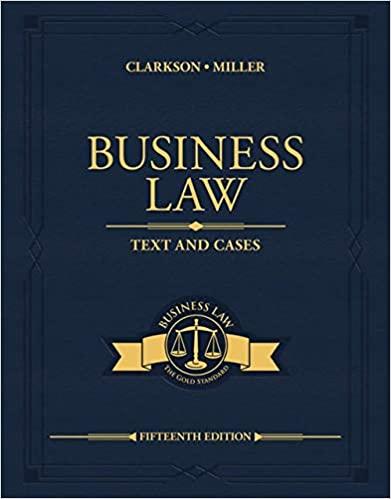Question
When a person does not live up to the standards set by law, society may regard this person's conduct as so dangerous to the government,
When a person does not live up to the standards set by law, society may regard this person's conduct as so dangerous to the government, to other people, or to property that society will prosecute the person for the misconduct. This punishable conduct, called crime, may be common law or statutory in origin. Crimes are classified as felonies and misdemeanors. A felony is a crime that is punishable by imprisonment or death.
Minors, the insane, and the intoxicated are held criminally responsible to a limited extent. This means that in some cases they will not be held responsible for a crime that a normal, adult person would be.
Employers and corporations may be criminally responsible for their acts and the acts of their employees. The federal sentencing guidelines impose mandatory sentences for federal crimes and allow judges to consider whether the fact that a business promotes compliance with the law is a reason for reducing a sentence.
White-collar crimes include those relating to illegal methods of production, competition, and marketing, such as the illegal use of interstate transportation and communication. Other white-collar crimes include bribery, extortion, blackmail, and corrupt influence in politics and in business. Also included as white-collar crimes are counterfeiting, forgery, perjury, the making of false claims against the government, the obtaining
of goods or money by false pretenses, the use of bad checks, false financial reporting, obstruction of justice, and embezzlement. The common law crimes include those that involve injury to person and/or property, such as arson and murder.
Statutes have expanded the area of criminal law to meet situations in which computers are involved. The unauthorized taking of information from a computer is made a crime under both federal and state statutes.
The diversion of deliveries of goods and the transfer of funds, the theft of software, and computer raiding are made crimes to some extent by the federal Computer Access Device and Computer Fraud and Abuse Act of 1984 and the Electronic Fund Transfers Act of 1978.
Newer federal statutes that apply to computers are the Economic Espionage Act, which prohibits downloading or copying information via computer to give to a competitor, and the Digital Millennium Copyright Act that prohibits circumventing or designing programs to circumvent encryption devices.
Criminal procedure is dictated by the Fourth, Fifth, and Sixth amendments. The Fourth Amendment protects against unreasonable searches, the Fifth Amendment protects against self-incrimination and provides due process, and the Sixth Amendment guarantees a speedy trial. ANSWER QUSTIONS BASED ON TEXTS and based on issue rule analysis conclusion method:
1. Gail drove her automobile after having had dinner and several drinks. She fell asleep at the wheel and ran over and killed a pedestrian. Prosecuted for manslaughter, she raised the defense that she did not intend to hurt anyone and because of the drinks did not know what she was doing. Was this a valid defense?
2. Jennings operated a courier service to collect and deliver money. The contract with his customers allowed Jennings a day or so to deliver the money that had been collected. Instead of holding collections until delivered, Jennings made short-term investments with the money. He always made deliveries to the customers on time, but because he kept the profit from the investments for himself, Jennings was prosecuted for embezzlement. Was he guilty? [New York v Jennings,
504 NE2d 1079(NY)]
Step by Step Solution
There are 3 Steps involved in it
Step: 1

Get Instant Access to Expert-Tailored Solutions
See step-by-step solutions with expert insights and AI powered tools for academic success
Step: 2

Step: 3

Ace Your Homework with AI
Get the answers you need in no time with our AI-driven, step-by-step assistance
Get Started


